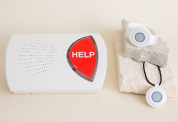Most Seniors Need To Sleep Better. These Eight Sleep Suggestions Can Help
June 1, 2020
There are many physical changes associated with aging, but the need for sleep never goes away. Unfortunately, seniors often suffer from insomnia and other sleep disorders. Poor sleep affects quality of life, mental acuity, and physical well-being. It also increases the risk of senior falls and nursing home placement.
Here are eight suggestions to help you fall asleep more quickly and wake up alert and rested.
Get regular, daily exercise
Regular exercise is good for your whole body. It improves balance, cardiovascular health, and releases mood-enhancing endorphins. A study conducted by Northwestern University found that aerobic exercise improved “the quality of sleep, mood, and vitality” in middle-aged and senior adults.
Always complete any vigorous workouts at least three hours before bedtime. Remember to consult with your doctor before beginning an exercise program.
Ask your doctor/pharmacist about possible drug side effects
Many seniors regularly take several prescription and over-the-counter medications without realizing that some may interfere with sleep, including:
- Antidepressants
- Corticosteroids
- Diuretics
- Anti-convulsants
- Beta blockers
Your doctor may be able to adjust your medication dosages or prescriptions to help limit the side effects and help you sleep better.
Sleep in a dark, quiet room
We all tend to sleep less soundly as we age, so light, noise, and other distractions can make it more difficult to fall asleep and stay asleep.
- Avoid electronics before bedtime
- Wear a sleep mask and/or keep the bedroom dark. Use a small nightlight for safety if you get up frequently at night.
- Block out noise with earplugs or a white noise machine.
Enjoy a daytime nap
A mid-day nap can help you catch up on sleep and stay energized throughout the day. Most sleep experts recommend naps lasting between 15 and 45 minutes. Anything more may make you feel groggy and make it harder to fall asleep later.
Get more sun or use a full-spectrum light source
Many studies of senior sleep disorders have found that regular exposure to sunlight or full spectrum lights helps adjust your circadian rhythm so that you fall asleep more easily and stay asleep. Aim for 30 minutes each day of sunlight. A full-spectrum lamp is useful during periods of inclement weather or the dark days of winter.
Avoid alcohol before bedtime
Drinking alcohol increases the production of adenosine, a sleep-inducing chemical, so a drink before bed can make you fall asleep quickly. However, it contributes to poor sleep overall in several ways:
- Night waking: As the adenosine’s effects wane, you’re likely to wake in before you’re fully rested.
- Sleep apnea/snoring: Alcohol relaxes the muscles in your throat, which can aggravate sleep apnea and snoring.
- Alcohol is a diuretic: Extra bathroom trips disrupt sleep. In addition, too much alcohol consumption can leave you dehydrated, which also contributes to poor sleep.
Replace your nightcap with a soothing cup of herbal tea before bed.
Develop a nighttime ritual
Right before bed is not the time to watch the news or the latest thriller on Netflix! Get your body used to winding down for the night with a consistent bedtime and regular pattern. Relaxing activities and dim lighting will calm your system, trigger the release of melatonin, and get you ready for a good night’s sleep.
Get Checked for Sleep Disorders
If you’ve tried changing your habits, but still suffer from poor sleep, don’t just assume it’s naturally part of aging. Talk with your doctor. Sleep apnea and restless leg syndrome are two of the most common sleep disorders, and both are treatable.
Insomnia and poor sleep affect your health. Daytime drowsiness can lead to falls and accidents. Lack of sleep weakens your immune system and may exacerbate cardiovascular problems. Researchers have found that sleep deprivation increases beta-amyloid levels in the brain. That protein is associated with impaired brain function and Alzheimer’s disease.
Everyone has a restless night every now and then. However, if you’re experiencing chronic sleep problems, talk to your doctor. Lack of sleep affects your health and quality of life just as much as any other health problem.
We thought you might also like:
Three Things To Consider Before Tapping Your Retirement Savings During The Coronavirus Crisis
You’re Never Too Old For Seasonal Allergies – Here’s How To Cope










